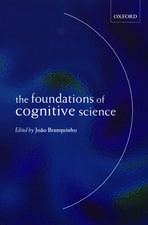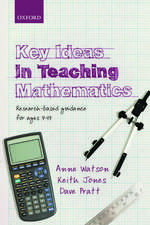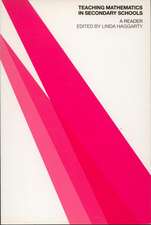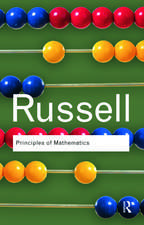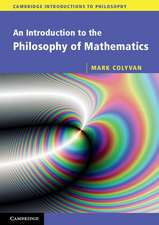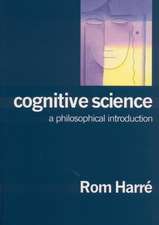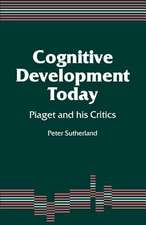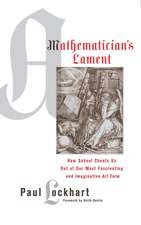Theories of Mathematical Learning
Editat de Leslie P. Steffe, Pearla Nesher, Paul Cobb, Bharath Sriraman, Brian Greeren Limba Engleză Paperback – aug 1996
This volume contains the proceedings of Work Group 4: Theories of Mathematics, a subgroup of the Seventh International Congress on Mathematical Education held at Université Laval in Québec. Bringing together multiple perspectives on mathematical thinking, this volume presents elaborations on principles reflecting the progress made in the field over the past 20 years and represents starting points for understanding mathematical learning today. This volume will be of importance to educational researchers, math educators, graduate students of mathematical learning, and anyone interested in the enterprise of improving mathematical learning worldwide.
| Toate formatele și edițiile | Preț | Express |
|---|---|---|
| Paperback (1) | 679.76 lei 6-8 săpt. | |
| Taylor & Francis – aug 1996 | 679.76 lei 6-8 săpt. | |
| Hardback (1) | 1015.29 lei 6-8 săpt. | |
| Taylor & Francis – sep 1996 | 1015.29 lei 6-8 săpt. |
Preț: 679.76 lei
Preț vechi: 799.72 lei
-15% Nou
Puncte Express: 1020
Preț estimativ în valută:
130.07€ • 136.15$ • 108.26£
130.07€ • 136.15$ • 108.26£
Carte tipărită la comandă
Livrare economică 31 martie-14 aprilie
Preluare comenzi: 021 569.72.76
Specificații
ISBN-13: 9780805816624
ISBN-10: 0805816623
Pagini: 544
Dimensiuni: 152 x 229 x 31 mm
Greutate: 0.73 kg
Ediția:1
Editura: Taylor & Francis
Colecția Routledge
Locul publicării:Oxford, United Kingdom
ISBN-10: 0805816623
Pagini: 544
Dimensiuni: 152 x 229 x 31 mm
Greutate: 0.73 kg
Ediția:1
Editura: Taylor & Francis
Colecția Routledge
Locul publicării:Oxford, United Kingdom
Public țintă
ProfessionalCuprins
Contents: Preface. Part I: P. Cobb, Sociological and Anthropological Perspectives on Mathematics Learning. P. Cobb, B. Jaworski, N. Presmeg, Emergent and Sociocultural Views of Mathematical Activity. J. Voigt, Negotiation of Mathematical Meaning in Classroom Processes: Social Interaction and Learning Mathematics. G.B. Saxe, T. Bermudez, Emergent Mathematical Environments in Children's Games. J. Richards, Negotiating the Negotiation of Meaning: Comments on Voigt (1992) and Saxe and Bermudez (1992). A.D. Schliemann, D.W. Carraher, Negotiationg Mathematical Meanings In and Out of School. E. Yackel, Social Interaction and Individual Cognition. B. van Oers, Learning Mathematics as a Meaningful Activity. E.A. Forman, Learning Mathematics as Participation in Classroom Practice: Implications of Sociocultural Theory for Educational Reform. K. Crawford, Cultural Processes and Learning: Expectations, Actions, and Outcomes. J.W. Stigler, C. Fernandez, M. Yoshida, Traditions of School Mathematics in Japanese and American Elementary Classrooms. Part II: B. Greer, Cognitive Science Theories and Their Contributions to the Learning of Mathematics. B. Greer, Theories of Mathematics Education: The Role of Cognitive Analyses. G. Hatano, A Conception of Knowledge Acquisition and Its Implications for Mathematics Education. G. Vergnaud, The Theory of Conceptual Fields. D.W. Carraher, Learning About Fractions. P.W. Thompson, Imagery and the Development of Mathematical Reasoning. R.B. Davis, Cognition, Mathematics, and Education. Part III: G.A. Goldin, The Contribution of Constructivism to the Learning of Mathematics. G.A. Goldin, Theory of Mathematics Education: The Contributions of Constructivism. E. von Glasersfeld, Aspects of Radical Constructivism and Its Educational Recommendations. F. Marton, D. Neuman, Phenomenography and Children's Experience of Division. P. Ernest, Varieties of Constructivism: A Framework for Comparison. N. Herscovics, The Construction of Conceptual Schemes in Mathematics. G. Booker, Constructing Mathematical Conventions Formed by the Abstraction and Generalization of Earlier Ideas: The Development of Initial Fraction Ideas. G.A. Goldin, J.J. Kaput, A Joint Perspective on the Idea of Representation in Learning and Doing Mathematics. C.A. Maher, A.M. Martino, Young Children Invent Methods of Proof: The Gang of Four. C. Janvier, Constructivism and Its Consequences for Training Teachers. Part IV: Perspectives on the Nature of Mathematical Learning. W. Dörfler, Is the Metaphor of Mental Object Appropriate for a Theory of Learning Mathematics? L.P. Steffe, H.G. Wiegel, On the Nature of a Model of Mathematical Learning.
Notă biografică
Leslie P. Steffe, Pearla Nesher, Paul Cobb, Bharath Sriraman, Brian Greer
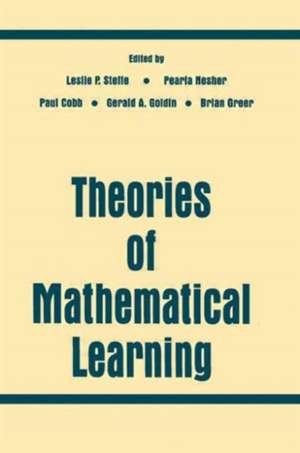
![Maths Frameworking -- Pupil Book 3.1 [Third Edition]](https://i2.books-express.ro/bt/9780007537778/maths-frameworking-pupil-book-3-1-third-edition.jpg)


